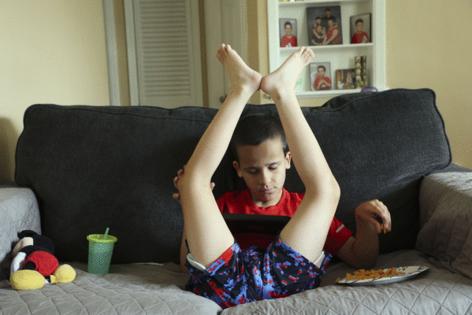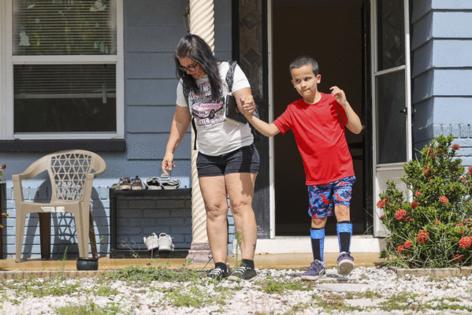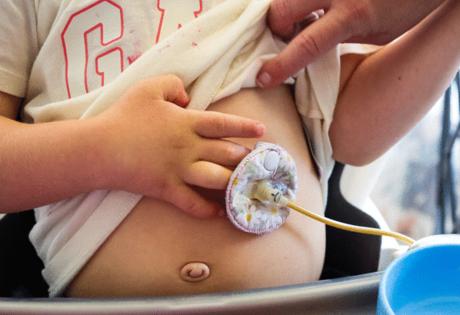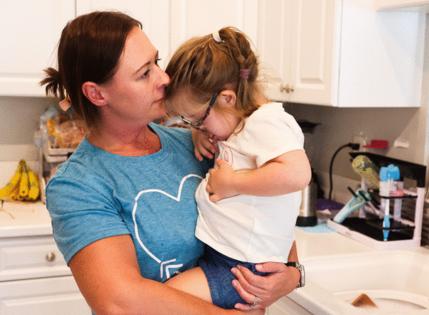Florida moms of disabled children denied medical care pin hope on old lawsuit
Published in News & Features
TAMPA, Fla. — When Caroline Hagan was approved for at-home nursing care, it was a blessing for her family.
The Lithia girl was born with Down syndrome, a congenital heart disease, hypothyroidism and a severe pediatric feeding disorder. She takes 15 medications every day, either through a feeding tube or a spray dispenser, and needs constant care.
In March, Medicaid administrators agreed with the girl’s doctor to increase her weekly in-home nursing schedule from 50 to 90 hours. One nurse accompanied her to school, while another took over at 3 p.m., allowing her mom, Alyssa Hagan, to work her full-time administrative job.
But within three weeks, Sunshine Health, the company hired to run Florida’s program for medically fragile children, reversed its decision, saying the extra care wasn’t medically necessary.
This has left her mom trying to work with a laptop perched on her knee while keeping up with Caroline, an active 4-year-old who must be monitored due to her risk of falling.
“I’m constantly pulled in two directions,” Alyssa Hagan said.
The Tampa Bay Times reported in June that Sunshine Health has denied at-home nursing for more than 100 medically fragile children this year. The company has continued to cut in-home nursing schedules and, in some cases, also refused to pay for prescribed medication. Appeals against those decisions reviewed by Florida Agency for Health Care Administration officers have mostly failed.
Now, Hagan and other families are pinning their hopes on a 13-year-old federal lawsuit that ordered Florida to provide skilled in-home nursing to medically complex children so the burden of care doesn’t fall on parents alone.
In a rare legal move, eight mothers of disabled children who were denied care have filed sworn declarations in the case, outlining how the denial of medical services is putting their children’s health at risk.
Among the eight is Lakeland mom Brandie Campbell. Her son, Takoda, has multiple health issues, including heart defects, weak cartilage in his airways and autism.
Alena Nicely’s 7-year-old son, Tyler, has cerebral palsy, epilepsy, and difficulties breathing and swallowing. Nicely, who adopted Tyler from Hillsborough County’s foster care system in 2020, was denied at-home nursing even though she has arthritis in her spine and can barely lift Tyler, who weighs 76 pounds.
Orlando-area single mom Jamaris Westerband’s daughter was denied at-home nursing. That was despite the child’s neurologist warning that her pattern of prolonged seizures requires immediate care and that the child could need “rescue medication” if she has more than three seizures in an hour. The girl sometimes needs to be intubated so she can be sedated when her seizures become too frequent.
Matt Dietz, a professor and clinical director of the Disability Inclusion and Advocacy Law Clinic at Nova Southeastern University, helped the mothers compile their declarations. In a legal brief he submitted, he wrote that some parents reported their child had to be hospitalized after experiencing a medical episode when no nurse was available.
Some parents, overwhelmed by the demands of caring for their child, are now considering putting them in long-term care institutions, he said.
Sunshine Health issued the denials even though Florida is under a federal injunction to meet benchmarks to provide skilled in-home nursing so that caring for medically complex children doesn’t fall on parents alone.
“The consequences of these denials are dire,” Dietz wrote in his legal brief. “Parents are forced to forgo employment, delay their own medical care, and provide complex medical interventions without professional support.”
The state is paying Sunshine Health $12.9 billion to run the Children’s Medical Services program over roughly 5 1/2 years. It serves medically fragile children and youths up to the age of 20.
Sunshine Health is owned by Centene, a publicly traded company that agreed to a $67 million settlement with Florida for overbilling for Medicaid services. About $10 million of the settlement was given to the Hope Florida Foundation, the fundraising arm of an initiative started by Casey DeSantis. It donated the money to political groups, which passed most of it on to a political committee that helped defeat a ballot initiative to legalize recreational marijuana.
Sunshine officials said they are following state and federal rules that ensure “health plans provide care based on what a child medically needs.”
“We understand how important it is for families to feel supported and heard when seeking care for a child with complex medical needs,” Elizabeth Boyd, Sunshine Health’s external relations director, said in an email. “We have board-certified pediatricians who assess each child’s case using established clinical guidelines and a thorough understanding of the child’s individual needs.”
Attorneys representing Florida objected to the filing of the families’ accounts and asked them to be stricken from the court record. They characterized the mothers’ accounts of their children’s plight as “unauthorized, intrusive, irrelevant, factually inaccurate, and incapable of verification.”
“Our Agency remains committed to ensuring that children enrolled in Florida Medicaid have access to all medically necessary services,” said Mallory McManus, spokesperson for the Agency for Health Care Administration.
The Department of Justice, which successfully sued Florida for failing to provide in-home medical services, also objected to the declarations. The mothers’ statements included medical information about their children that is typically protected under federal privacy laws, its motion stated. The children, with one exception, were not named but referenced by their initials.
U.S. District Judge Donald Middlebrooks, who is overseeing Florida’s compliance with the injunction, ruled that the mothers’ declarations can remain in the court record.
Two years ago, Middlebrooks determined that Florida had violated the Americans with Disabilities Act by failing to provide in-home medical care, which could result in children being isolated in long-term care institutions. He holds quarterly hearings to determine if Florida is complying with the injunction.
But it’s unclear if Middlebrooks will take any action or demand answers from state officials on why families of medically fragile children are still struggling to get care for their children.
The injunction he ordered is intended to address systemwide failures in Florida’s treatment of medically fragile children, not individual cases, but he could ask the state to report how many denials of nursing care have been issued, Dietz said.
“These families are bellwethers — they are exemplars of what’s happening on the ground and whether or not the state is complying with its duty of care," Dietz said
The moms who filed statements and others plan to attend the next hearing on the state’s compliance with the injunction, but that may not happen soon. Earlier this month, Department of Justice attorneys requested a stay because of the federal government shutdown.
Prescribed medication denied
Caring for Jaida Young is exhausting.
The 7-year-old from Port Richey has been diagnosed with autism, attention deficit hyperactivity disorder, obsessive compulsive disorder and an immune system deficiency.
She also has pica, an eating disorder characterized by compulsively eating non-food items. That means she has to be watched constantly, lest she try and consume Vaseline or lip balm, or any other small object she can cram into her mouth.
Sleep is also a challenge. Jaida has sleep apnea, chronic bronchitis and asthma.
Her mom, Kelly Young, works as a nurse and knows how to care for her daughter. But she needs to work, too. At times, she’s been forced to put Jaida in a prescribed pediatric extended care, essentially a medical daycare.
Sunshine recently denied Jaida a prescription for Dulera, an asthma medication that helps prevent flare-ups of the respiratory condition.
The August denial letter stated that Jaida didn’t need the medication since she had not had an asthma flare-up that required medication like albuterol in the past 180 days.
That infuriated Young, who said it merely showed that the Dulera was working. Jaida’s prescription was eventually restored after her primary care doctor advocated for her.
In the past two years, Sunshine has cut Jaida’s nursing hours from 40 to zero and denied her appeal. Then it restored the child’s nursing when she reapplied with a different nursing agency.
A single mom, Young said every day is a struggle.
“It’s overwhelming,” she said. “I feel like I can’t do what I need to do to take care of her because I’m constantly on the phone going through hoops to get what we need for her.”
‘Over and over again not doing the right thing’
Along with Dietz, Florida State University professor Paolo Annino was one of the attorneys who represented families of medically fragile children who sued Florida in 2012.
At that time, around 300 medically fragile children who could have been cared for at home were in nursing homes. Many more children were at risk of ending up with the same outcome.
“These are children on the precipice of life and death,” he said. “At home, medically fragile children have something they will never get at a nursing home, that is love from a caring, sensitive caregiver.”
Annino is the co-director of FSU’s Children’s Advocacy Clinic, which provides assistance to families of disabled, trafficked and vulnerable children.
After Middlebrooks ruled against Florida, there were few calls for help from families of disabled children. That changed about a year ago, Annino said, with the clinic now handling the cases of dozens of families appealing against Sunshine Health’s denials.
The clinic has so many cases, it can no longer accept new ones, he said.
Annino sits in on some appeal hearings. At one, a Sunshine medical director refuted the testimony of Dr. Frederick Frick, a pediatric cardiology and congenital heart disease specialist who said that a child needed nursing around the clock.
Frick was the chief of the pediatric cardiology division at the University of Florida from 1995 to 2014 and is renowned in his field, Annino said. An officer for the Agency for Health Care Administration who was hearing the appeal sided with Sunshine’s medical director.
“Sunshine is over and over again not doing the right thing,” Annino said. “They’re no longer accepting what the primary care doctors and specialists say are medically necessary.”
His clinic is assisting Daina Rogers, a single mom of four.
Her son, Mayik Vallejos, 10, has a genetic disorder that causes non-cancerous tumors to grow in various organs, including the brain. The tumors can cause seizures.
He has also been diagnosed with Lennox-Gastaut syndrome, a severe form of childhood epilepsy characterized by multiple types of seizures. He had open-heart surgery in 2020 and brain surgery a year later. He takes medication and liquid through a feeding tube.
For more than a year, Mayik received 136 hours of nursing care a week, which allowed Rogers to work evenings as a Pizza Hut manager and homeschool one of her other children, who has attention deficit hyperactivity disorder.
Sunshine in February reduced that to 80 hours. Rogers appealed the denial, but it was upheld by a state hearing officer.
She recently switched to a different nursing agency since the one she was with could not fill many of the assigned shifts. The move triggered another evaluation of her son’s medical needs, and a Sunshine Health medical director earlier this month further reduced her in-home nursing schedule, this time to 48 hours a week.
The notice gives the child’s pediatrician or specialist 48 hours to dispute the decision with Sunshine officials. Parents say that’s not enough time to schedule a call with busy medical professionals.
She plans to file another appeal. Without skilled nursing, she cannot leave Mayik alone. She has missed numerous work shifts and her paychecks have shrunk.
“I’ve fallen behind in my bills,” she said. “I’m trying to figure out how to keep the lights on.”
_____
©2025 Tampa Bay Times. Visit tampabay.com. Distributed by Tribune Content Agency, LLC. ©2025 Tampa Bay Times. Visit at tampabay.com. Distributed by Tribune Content Agency, LLC.
















Comments